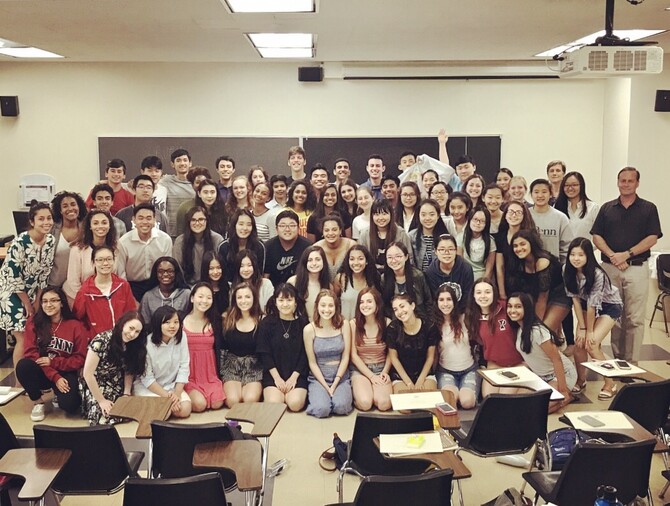Penn’s Social Justice Research Academy for High School Students: Life Lessons for Tackling Tough Topics
For three weeks in July, the University of Pennsylvania’s Social Justice Research Academy offered 65 high school students from around the world intensive lessons in understanding contemporary social issues.
Academy attendees explored such topics as racial inequality, immigration and global human rights along with the history of religious freedom, civil rights and other social movements. The residential program also provided them with a taste of college life and an opportunity to explore Philadelphia’s cultural history.
One of six pre-collegiate summer academies at Penn, the Social Justice Research Academy is the only one that is social science-based. The others focus on STEM, science, technology, engineering and math.
R. Scott Hanson, a lecturer in the History Department in the School of Arts & Sciences, has served as the Academy’s director for two years and says it is needed now more than ever.
“We are in an increasingly polarized society and often, big problems get reduced to simplistic answers,” Hanson says. “We need to think deeply and in more complex ways. That’s what this academy gives to young students interested in social justice.”
The visiting high schoolers viewed documentaries and participated in workshops and discussion groups with Penn faculty members and with guests representing politics, race and gender, economics, history and sociology.
Patricia Kim of the Penn Program in Environmental Humanities discussed environmental concerns with the group. Speakers also included Dorothy Roberts, a Penn Integrates Knowledge Professor in law, sociology and Africana studies; Maria Antonia Andrews, the associate director of undergraduate programs in Penn’s Earth & Environmental Science Department; Keeanga-Yamahtta Taylor, an assistant professor of African-American Studies at Princeton University; and Erica Armstrong Dunbar, a Penn alumna who is now a history professor at Rutgers University.
“This year’s line-up of speakers was really impressive and, more importantly, representative of the crucial issues around social justice,” Hanson says.
Barry Wang, a 16-year-old participant from Yantai, China, says Eileen Doherty-Sil, the associate director of the undergraduate program in Penn’s Political Science Department, delivered a comprehensive talk that deepened his understanding of human rights.
“Her lesson explained the fundamental differences between philosophical ideologies and how they lead to different political ideas,” says Wang, who took advantage of the campus resources shared with academy attendees, including the Van Pelt Library and Penn Museum.
Ten percent of the seats in all six Penn Summer Research Academies are reserved to offer full scholarships to students from Philadelphia’s public and charter high schools.
One of those seats went to 16-year-old Zoey Tweh from West Philadelphia. Tweh is a rising junior at the Science Leadership Academy High School. She says for her the talk with Pennsylvania House Rep. Chris Rabb stood out.
Tweh, who became passionate about social justice when she was a sixth-grader at the Penn Alexander School, says the session taught her about how to have a meaningful discussion across differences.
“It didn’t feel like a lecture,” says Tweh, “It was a lot more real and down-to-earth than that. I know now how to have a conversation worth my time. The goal is not to make people feel guilty. It’s about learning from each other. I’m not here to change people’s minds, but I am here to expand my own.”
In addition, the academy offered field trips around Philadelphia to historical sites, such as the American Philosophical Society, African-American Museum and murals in El Barrio.
During his free time, Nicolas García, a 15-year-old from Irvine, Calif., enjoyed walking around Penn’s campus and trying some of the nearby restaurants.
“Above all,” García says. “I really enjoyed meeting students from the other Penn Summer Academies because they expanded my world view due to their unique identities and backgrounds.”
To successfully complete the program, each visiting high school student was required to produce and present a research project focused on social justice.
García researched the affordable housing crisis in Los Angeles; Tweh examined the civil rights movement in Philadelphia during the 1950s; and Wang argued the relationship between morality and the duty of the state.
“I hope the students were able to take home a new set of tools, new ways of looking at the world and thinking about problems,” Hanson says, “so that they can become active in their communities in a sustained way and realize that real change may not come as quickly as they’d like but to dig in and be committed to it for life.”








